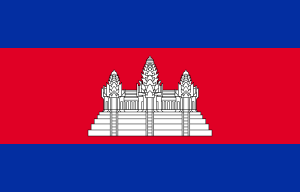Language/Central-khmer/Vocabulary/Family-Members
| ◀️ Possessive Pronouns — Previous Lesson | Next Lesson — Relationship Status ▶️ |
Central Khmer is a language spoken in Cambodia and is also known as Khmer. It is the official language of Cambodia and is spoken by over 99% of the country's population. It is a fascinating language to learn, and one of the best ways to get started is to learn the vocabulary for family members in Central Khmer. In this lesson, we will learn the Central Khmer words for parents, siblings, and extended family.
After mastering this lesson, these related pages might interest you: Food & Introducing Yourself.
Vocabulary[edit | edit source]
Immediate Family Members[edit | edit source]
In Central Khmer, immediate family members are often referred to by their relationship to the speaker. Here are some common words for immediate family members in Central Khmer. Please note that Central Khmer does not differentiate between aunts and uncles on the basis of their maternal or paternal lineage.
| Central Khmer | Pronunciation | English |
|---|---|---|
| ឪពុក [ʼəwpuk] | /ʔəw.ˈpuk/ | father |
| ម្ដាយ [mdaay] | /mɗaːj/ | mother |
| កូនប្រុស [koun proh] | /koun ˈproh/ | son |
| កូនស្រី [koun srəy] | /koun ˈsrəj/ | daughter |
| បងប្រុស [bɑɑng proh] | /ɓɑːŋ ˈproh/ | older brother |
| ប្អូនប្រុស [pʼoun proh] | /pʔoun ˈproh/ | younger brother |
| បងស្រី [bɑɑng srəy] | /ɓɑːŋ ˈsrəj/ | older sister |
| ប្អូនស្រី [pʼoun srəy] | /pʔoun ˈsrəj/ | younger sister |
Extended Family Members[edit | edit source]
In Central Khmer, extended family members are also often referred to by their relationship to the speaker, but there are also some specific words to describe certain family members. Here are some common words for extended family members in Central Khmer.
| Central Khmer | Pronunciation | English |
|---|---|---|
| តា [taa] | /taː/ | grandfather |
| យាយ [yiəy] | /jiəj/ | grandmother |
| ពូ [puu] | /puː/ | uncle |
| មីង [miing] | /miːŋ/ | aunt |
| ឪពុកក្មេក [ʼəwpuk kmeek] | /ʔəw.ˈpuk.kʰmeːk/ | father-in-law |
| ម្ដាយក្មេក [mdaay kmeek] | /mɗaːj.kʰmeːk/ | mother-in-law |
| កូនប្រុសប្រសា [koun proh prɑsaa] | /koun.proh.prɑ.ˈsaː/ | son-in-law |
| កូនស្រីប្រសា [koun srəy prɑsaa] | /koun.srəj.prɑ.ˈsaː/ | daughter-in-law |
| បងថ្លៃ [bɑɑng thlay] | /ɓɑːŋ.tʰlaj/ | older-sibling-in-law |
| ប្អូនថ្លៃ [pʼoun thlay] | /pʔoun.tʰlaj/ | younger-sibling-in-law |
Usage[edit | edit source]
When referring to family members in Central Khmer, it is important to remember to use the correct honorific titles. These titles vary depending on the age and gender of the family member being referred to. For example, when addressing an older sister, the speaker would use the honorific title "bong" followed by the sister's name. Similarly, when addressing an older brother, the speaker would use the honorific title "bong" followed by the brother's name.
It is not polite in Central Khmer culture for the younger generation to address elders by their full names, hence why we use honorifics. Family members in the older generation may also be referred to by their relationship to the speaker, such as "ming" (Aunt) or "pu" (Uncle).
Conclusion[edit | edit source]
Learning the Central Khmer words for family members is an important part of understanding the language and the culture of Cambodia. By knowing these words and the correct honorific titles to use when addressing family members, you will be able to communicate more effectively with native speakers of Central Khmer. In the next lesson, we will learn how to talk about relationship status in Central Khmer.
Now that you've completed this lesson, don't stop learning! Check out these related topics: How to Say Hello and Greetings & Common Foods.
Other Lessons[edit | edit source]
- Health
- Modes of Transportation
- Money and Currency
- Telling Time
- Common Greetings
- How to say Good Bye?
- Counting from 1 to 100
- Discussing Interests
- Clothes
- Common Hobbies
Sources[edit | edit source]
| ◀️ Possessive Pronouns — Previous Lesson | Next Lesson — Relationship Status ▶️ |

